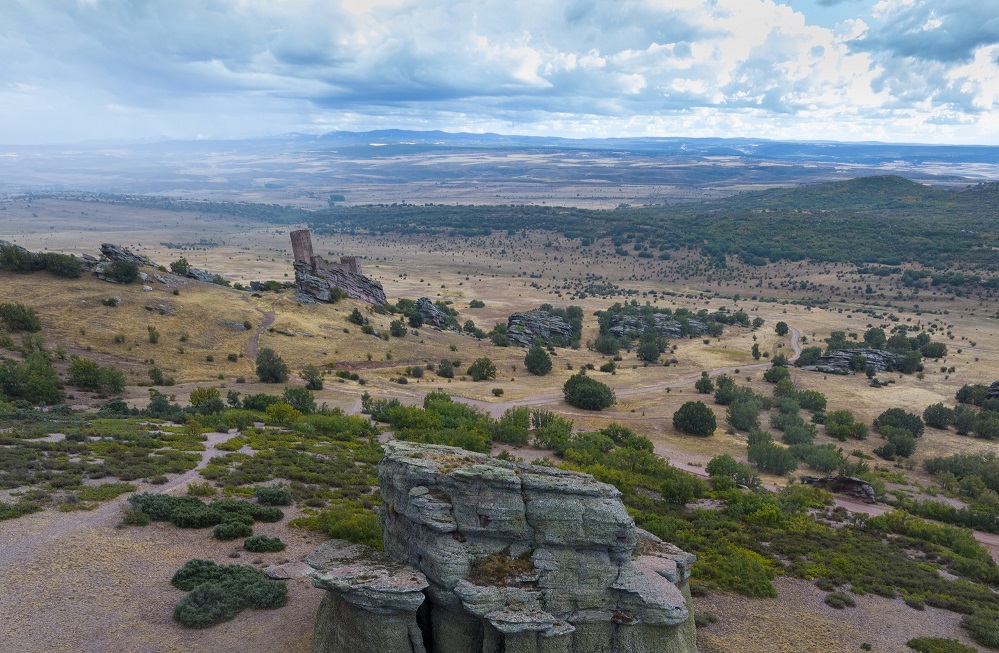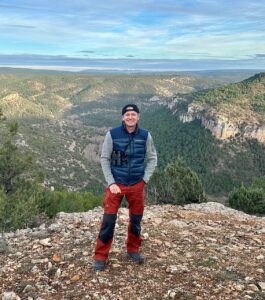Travelling can have a purpose beyond leisure, joy and satisfying the natural human curiosity for the unknown, learning and meeting other people and cultures. Actually, travelling can contribute to making Europe a wilder place when it is connected with creating awareness towards the importance of rewilding and nature restoration.

As well, travelling provide opportunities for delivering nature-based livelihood development through tourism in rural areas. These are some of the focal points of Rewilding Europe Travel (RET), a UK-based travel company incubated by Rewilding Europe that provides small groups with immersive experiences in Europe’s rewilding landscapes. Doing so, people interested in being part of a #NaturePositive philosophy can focus their trips also in helping to address challenges such as biodiversity decline and climate change and make the planet more livable for all.
Neil Rogers is the Co-founder of Rewilding Europe Travel and has over 35 years of experience in the fields of tourism, conservation, and sustainable development. Neil has recently visited Iberian Highlands together with the Rewilding Spain team in order to have his own immersive experience and explore the potential opportunities for tourism and how Rewilding Europe Travel can add Iberian Highlands to their trips portfolio.

Q. As an expert, you have widely travelled around the world. When coming to Iberian Highlands, did what you found fit with your previous expectations or was it somehow surprising for you?
A. I had conducted a little research online before I travelled to Alto Tajo so I was expecting quite a spectacular landscape, however, what I found certainly exceeded my expectations. The sheer scale and grandeur of the landscape is the first thing that grabs you. It’s considerably more diverse than I was expecting and although I knew it was sparsely populated the lack of humans within the landscape was something that most urban based Europeans who are interested in nature will find very attractive.
Q. Which would you say are the main strengths of this area for tourism?
A. Firstly, the close proximity to Madrid makes the Iberian Highlands attractive for tourism. Madrid is a globally known cultural capital that is easily accessible by air, rail and road. Clients can enjoy a stay in Madrid, Cuenca or other fabulous cultural destinations before or after exploring the wild nature of the Iberian Highlands. The sheer scale of the Iberian Highlands Rewilding Area combined with its low population density are perhaps its most important assets. There’s space in abundance and few visitors sharing it. The density of deer (Red, Roe and Fallow) and Griffon vultures also surprised me – they were everywhere. The fact that Alto Tajo and the majority of the Iberian Highlands remains ‘hidden’ and unknown to most Europeans is a major attraction and selling point.
Q. Given there’s a cliché about the kind of leisure, activities, and values that Spain offers to tourists, how do you think the nature-based potential of Iberian Highlands could fit in the mindset of the potential visitors?
A. The Iberian Highlands is definitely ‘alternative’ Spain. It will push visitors’ perceptions when it comes to climate, culture and terrain as it is a landscape of extremes – the coldest in winter, the least populated and one of the most extensive networks of canyons in Spain. It’s a landscape that cries out to be walked and explored. A place to immerse in nature, far away from noise and crowds. There are landscapes in Spain where visitors may see more spectacular wildlife, especially predators but the beauty of Alto Tajo and the Iberian Highlands is the awesomeness of its emptiness, silence and sheer scale.
Q. After this visit, which would be Rewilding Europe Travel plans regarding this landscape?
A. RET’s immediate plan is to offer a small range of products that focus on fixed dated small group travel, flexible date private trip planning for small groups and a corporate travel product that includes rewilding experiences. We’ll initially focus on the Alto Tajo region and hope to have our new experiences ready to welcome the first clients to the Iberian Highlands in the Spring of 2023.
Q. A message for local entrepreneurs: which are the main opportunities for starting-up new businesses?
A. Development of a landscape-based supply chain for quality services is very important for RET and this is something we’re working on closely with the enterprise team at Rewilding Spain. Transport to small communities in Alto Tajo (from Madrid) and especially for touring around the landscape remains a challenge due to the lack of a dedicated nature focused DMC (Destination Management Company) that is based within the Alto Tajo region. The often rugged gravel roads of the region are tough on vehicles of the size and comfort we need for small groups. There is also a limited pool of experienced, English speaking nature guides who live in the landscape; and the lack of English as a second language in the hospitality sector is also a development challenge that needs addressing as business is scaled up.
We have identified two or three hotels we can happily use but RET ideally needs more family run, character properties and room inventory. Post covid, restaurants and bars in the towns and villages are often closed and this means the culinary (and community insight dining in them brings) aspect of our tours will initially be rather limited until there is sufficient visitation to encourage restaurants and bars to open.
Q. Please, make a confession: what did you like the most?
A. I loved the solitude and freedom of walking in a vast, wild landscape of oak, pine and juniper forests where spectacular canyons plunged below me, and ever-present vultures soar above. I loved picnicking on superb local cheese, sausage and crusty bread washed down with a hearty red from Finca Río Negro. I loved the warm hospitality and enthusiasm from everyone I met, from Basi and Pablo at Rewilding Spain, Juana from beautiful Cobeta, from the Mayors of Checa and Orea, Jesús and Marta, to my charming hosts Carmen and Chema at El Descansillo.
About
Rewilding Spain is part of Rewilding Europe network and leads on the ground the Iberian Highlands rewilding initiative, a long-term action plan that has been launched in a territory of 850,000 hectares located in in Castilla-La Mancha and Aragon regions.
For the implementation of the initiative, we have funding from the Endangered Landscapes Programme and the Cartier Foundation for Nature.
